- Book Review Published on the LSE Review of Books Website February 22, 2023
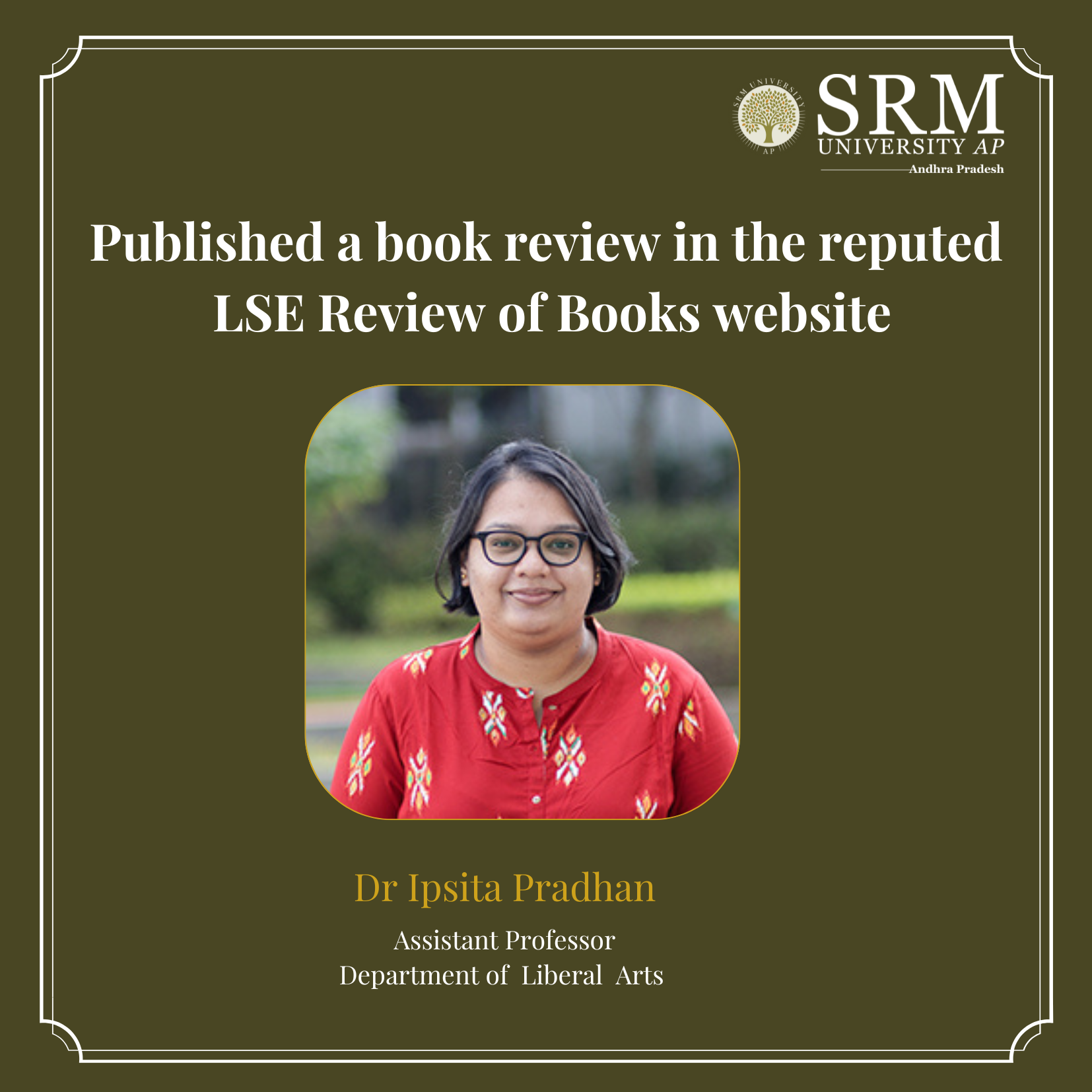 Assistant Professor Dr Ipsita Pradhan, Department of Liberal Arts, has recently published a book review on the renowned LSE Review of Books website. In her recent review, Dr Pradhan offers insightful perspectives on the book Confidence Culture by Shani Orgad and Rosalind Gill. This crucially important book appeals to media studies, American studies, and feminist scholars, as well as a wide public audience.
Assistant Professor Dr Ipsita Pradhan, Department of Liberal Arts, has recently published a book review on the renowned LSE Review of Books website. In her recent review, Dr Pradhan offers insightful perspectives on the book Confidence Culture by Shani Orgad and Rosalind Gill. This crucially important book appeals to media studies, American studies, and feminist scholars, as well as a wide public audience.Dr Ipsita Pradhan elaborates on how the book assures that self-love affirmations in contemporary times are not free from the disciplinarian gaze of the market and its neoliberal capitalist mechanisms, as it is often measured through one’s productivity. She commends the authors’ rigorous research and compelling arguments, stating that the book offers a much-needed critique of the prevailing cultural narrative around confidence.
“In Confidence Culture, Shani Orgad and Rosalind Gill explore the demands that the cultural imperative of confidence particularly places on women. Enriched by abundant examples drawn from across popular culture to show how ‘confidence culture’ puts the onus on individuals to navigate and solve systemic problems, this book is necessary reading for scholars of gender, media studies and sociology”, writes Dr Ipsita Pradhan.
LSE Review of Books publishes daily reviews of academic books across the social sciences. It aims to facilitate the sharing and exchange of knowledge between experts within and outside the academy and to open up academic research to increase its impact. LSE Review of Books is a forum to encourage engagement with the latest academic publications across the social sciences and the humanities.
Click to read the full book review!
Continue reading → - Reservation for Communities in Sikkim: Examining the Political Demand January 27, 2023
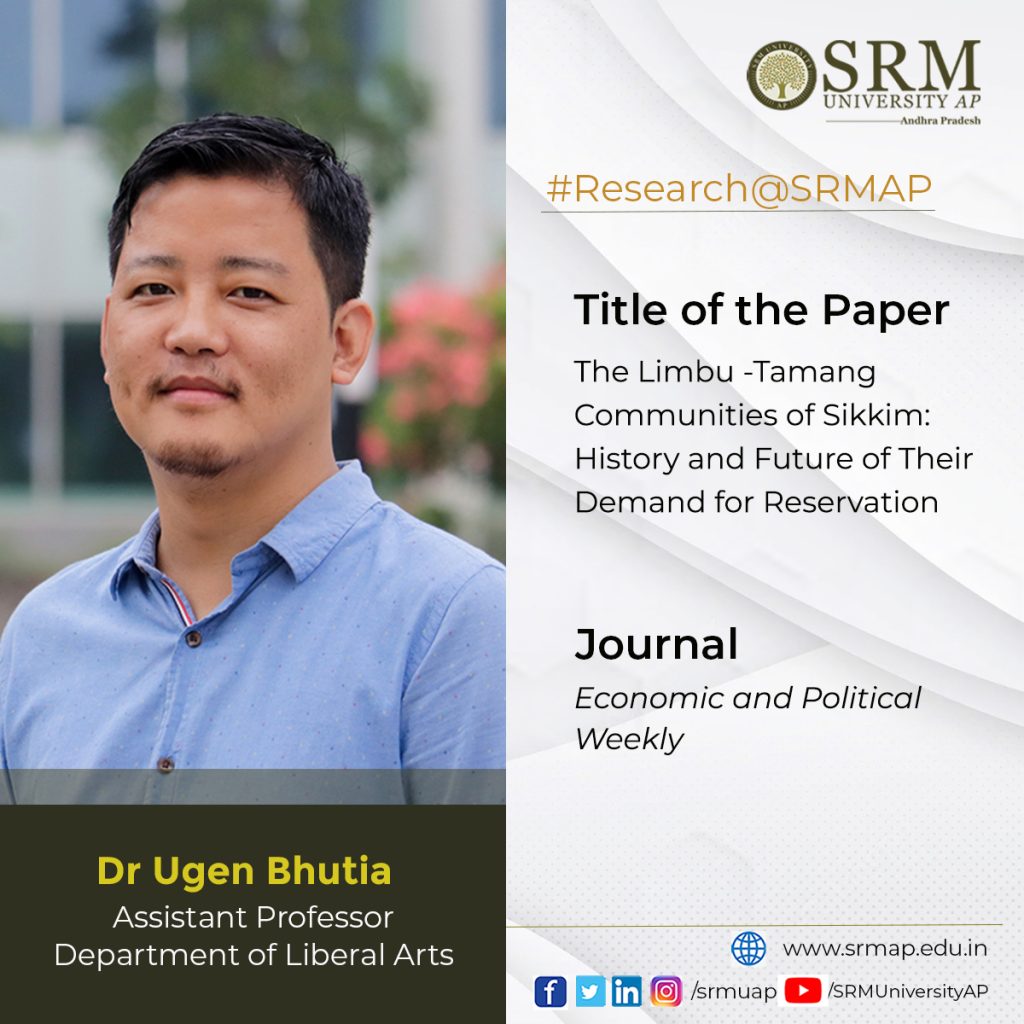 It is a prerequisite for a country like India showcasing vast cultural, social, political and economic diversity, for adopting an unprejudiced reservation system to ensure equal and just representation of varied communities in the political decision-making process of the country. But many communities that have been historically disadvantageous(SC/ST) still struggle to receive their right to representation. Dr Ugen Bhutia, Assistant Professor, Department of Liberal Arts, has published a paper titled “The Limbu–Tamang Communities of Sikkim History and Future of Their Demand for Reservation” in the Journal Economic and Political Weekly. The paper provides a comprehensive outlook on the complex history of the communities in Sikkim and past events that have cumulated in their demand for representation in the democratic polity of the country. The future direction of the demand for reservation and its prospective outcomes have also been emulated.
It is a prerequisite for a country like India showcasing vast cultural, social, political and economic diversity, for adopting an unprejudiced reservation system to ensure equal and just representation of varied communities in the political decision-making process of the country. But many communities that have been historically disadvantageous(SC/ST) still struggle to receive their right to representation. Dr Ugen Bhutia, Assistant Professor, Department of Liberal Arts, has published a paper titled “The Limbu–Tamang Communities of Sikkim History and Future of Their Demand for Reservation” in the Journal Economic and Political Weekly. The paper provides a comprehensive outlook on the complex history of the communities in Sikkim and past events that have cumulated in their demand for representation in the democratic polity of the country. The future direction of the demand for reservation and its prospective outcomes have also been emulated.Abstract
Since its merger in 1975 with the Indian union, one of the major sociopolitical issues in Sikkim has been the demand for reservation in the state legislative assembly for two communities—Limbu and Tamang. The demand of reservation for the Limbus and Tamangs crystallised in Sikkim when these communities were notified as Scheduled Tribes under the Scheduled Castes and Scheduled Tribes Orders (Amendment) Act, 2002. The history and future of this political demand has been analysed.
Continue reading → - A Critical Analysis of Faith-based Healing December 26, 2022
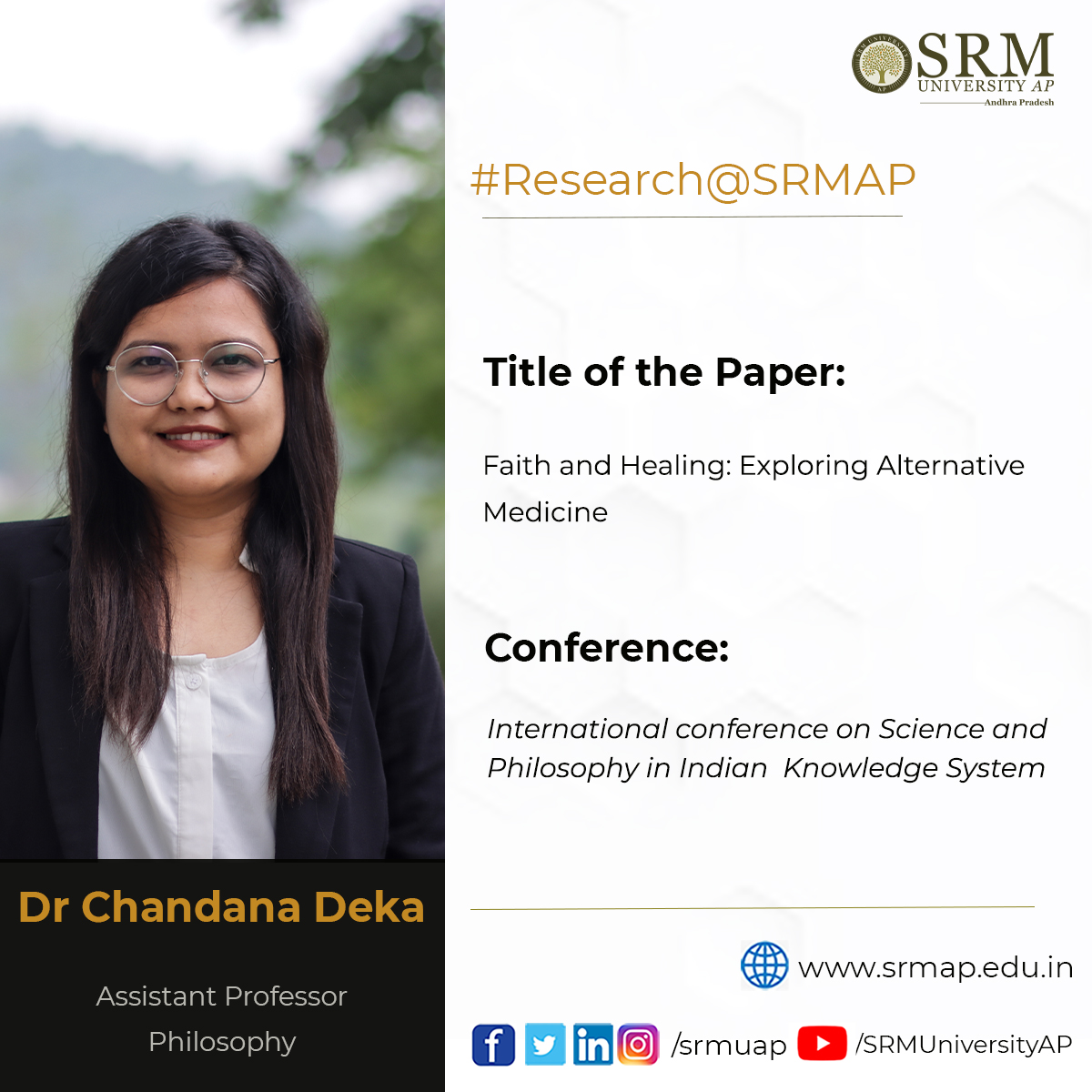 Dr Chandana Deka from the Department of Liberal Arts presented a paper titled Faith and Healing: Exploring Alternative Medicine at the international conference on Science and Philosophy in Indian Knowledge System organised by the Institute for Science and Spirituality Delhi in partnership with Noida International University IKS Division, Ministry of Education, Govt. of India from December 17 to 18, 2022. Her paper has also been published as part of conference proceedings.
Dr Chandana Deka from the Department of Liberal Arts presented a paper titled Faith and Healing: Exploring Alternative Medicine at the international conference on Science and Philosophy in Indian Knowledge System organised by the Institute for Science and Spirituality Delhi in partnership with Noida International University IKS Division, Ministry of Education, Govt. of India from December 17 to 18, 2022. Her paper has also been published as part of conference proceedings.Abstract
Fideism is a school of thought that gives importance to faith as against reason in matters related to religion. Fideism is defined as “the view that religious belief systems are not subject to rational evaluation” (Peterson, 2003). But matters related to religion do not confine only to the transcendental aspects of religion, it also impacts and influences the socio-cultural and ethical aspects (Durkheim, 1912). In this paper, the researcher discusses one such socio-cultural aspect of religious faith, that is, religious healing. Faith-based healing is often considered one form of alternative medicine (Andrew Village, 2005). In this paper, she explores this faith-based healing and contends that not all forms of faith-based healing can be appropriated. She tries to give a theoretical justification as to which forms of faith-based healing can be adopted and which need not be. The research is analytical and critical in nature based on materials that include books and articles written on fideism and different religious Texts.
Continue reading → - The prospects and challenges in India-ASEAN relations August 22, 2022
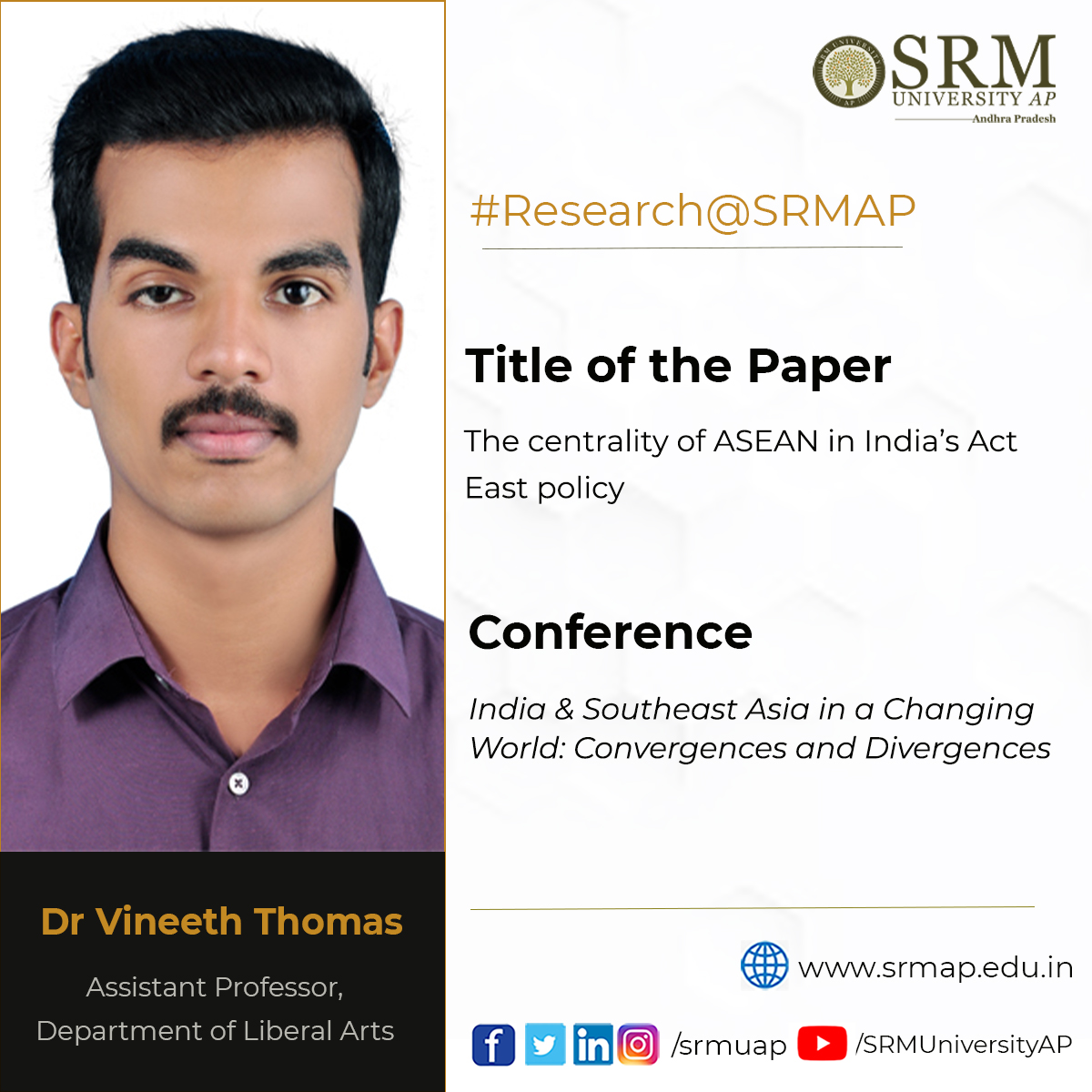 The upcoming international conference, India & Southeast Asia in a Changing World: Convergences and Divergences, will examine India’s Act East policy, investigating its prospects and challenges in the Southeast Asian region. Assistant Professor Dr Vineeth Thomas from the Department of Liberal Arts has been selected for presenting a paper at this Conference organised by Christ University, Delhi NCR. He will present the paper titled The centrality of ASEAN in India’s Act East policy at the conference.
The upcoming international conference, India & Southeast Asia in a Changing World: Convergences and Divergences, will examine India’s Act East policy, investigating its prospects and challenges in the Southeast Asian region. Assistant Professor Dr Vineeth Thomas from the Department of Liberal Arts has been selected for presenting a paper at this Conference organised by Christ University, Delhi NCR. He will present the paper titled The centrality of ASEAN in India’s Act East policy at the conference.The international conference will be held In-Person from 14 to 15 October 2022 at the CHRIST (Deemed to be University) Delhi-NCR campus. The Hanns Seidel Foundation funds this conference. The major focus area of the conference is India’s foreign policy towards ASEAN countries like Myanmar, Thailand, Malaysia, Vietnam, Indonesia, and Singapore
Abstract
Against the backdrop of multi-dimensional developments and interventions in the Indo-Pacific region, India’s overseas policy and national security apprehensions have undergone substantial changes in the past few decades. Starting with the Look East Policy in the 1990s, India advanced its policy in 2014 as Act East Policy. The potential benefits of bilateral and multilateral relations in the Indo-pacific region made India take up its partnership with the Association of Southeast Asian Nations (ASEAN) seriously, which provided an opening and strip for India to explore Southeast Asia. This paper evaluates the significance of keeping ASEAN at the heart of India’s Act East Policy by illustrating the prospects and challenges in India-ASEAN relations.
Continue reading → - Aesthetic labour, Body, and Femininity July 28, 2022
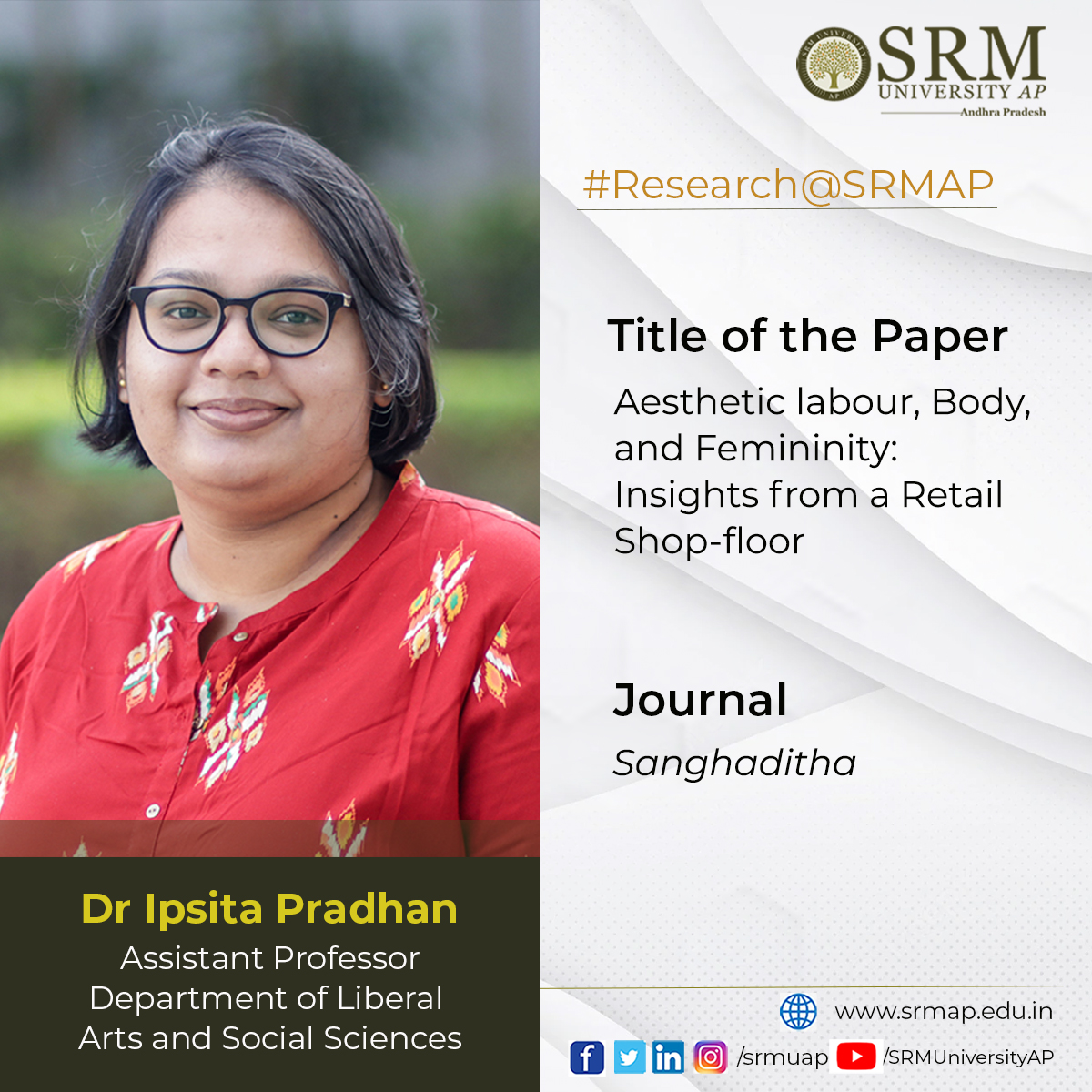 The value of certain looks or appearances is constructed intentionally, and it directly takes part in social stratification. The explanation for this practice can be found in the concept of aesthetic labour. Aesthetic labour implies the practice of screening, managing, and controlling workers on the basis of their physical appearance. When read together with femininity and body, the concept discloses several crucial dimensions. Assistant Professor Dr Ipsita Pradhan, Department of Liberal Arts, published an article titled Aesthetic labour, Body, and Femininity: Insights from a Retail Shop-floor in the journal Sanghaditha. The paper is translated from English to Malayalam by Dr Anu Kuriakose.
The value of certain looks or appearances is constructed intentionally, and it directly takes part in social stratification. The explanation for this practice can be found in the concept of aesthetic labour. Aesthetic labour implies the practice of screening, managing, and controlling workers on the basis of their physical appearance. When read together with femininity and body, the concept discloses several crucial dimensions. Assistant Professor Dr Ipsita Pradhan, Department of Liberal Arts, published an article titled Aesthetic labour, Body, and Femininity: Insights from a Retail Shop-floor in the journal Sanghaditha. The paper is translated from English to Malayalam by Dr Anu Kuriakose.Abstract
The essay discusses the importance of the body in interactive service work. By focusing on women retail shop floor workers, employed in the apparel and cosmetic sections of multi-national brands argues that employment in this sector requires working on one’s body to produce a “presentable” body by grooming so as to fit the larger image that the mall presents. The presence of the mannequin and its dressing is also analysed to understand how it perpetuates stereotypes of the ‘ideal’ body through the apparent function of attracting customers or giving the customers an idea of the products on display, simultaneously perpetuating the male gaze on ‘acceptable’ feminine bodies.
Continue reading →

